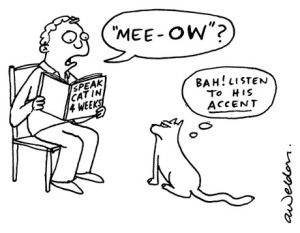Why most of us just can’t shake a foreign accent
Medical Pharmaceutical Translations • Feb 9, 2015 12:00:00 AM

“You have an accent! Where are you from?” is a question that I get a lot here in France. I’m not the only immigrant who’s come to learn this disappointing linguistic fact of life: Just because you speak a language fluently, doesn’t mean you speak it like a native. But there are moments when you ask the universe, “Why?”
It seems linguists and scientists have heard our foreign-accented cry. A number of recent studies reveal some really interesting things about why we talk the way we do.
One, undertaken by University of Kansas assistant linguistics professor Annie Tremblay, shows that intonation is mainly to blame: your brain processes intonation based on your native tongue, making it harder when your second language doesn’t follow the same rules about stressed syllables. This affects not only comprehension, but the way you speak. Interestingly, Tremblay’s team also found that non-native speakers who’d been immersed in another language for a long time showed signs of adapting to the new intonation patterns. This would explain why in many cases, when a foreigner constantly hears and uses a foreign language, their accent lessens.
Laura Geggel covered another study in an article full of fascinating information. For example, your brain is pretty flexible about picking up on and reproducing all kinds of sounds…until you’re about five years old. Then, it becomes a lot harder. But retaining an accent may also be due to the way languages are usually taught: a lot of language learning is written, in order to help students better memorize vocabulary and grammar rules, and less attention is paid to pronunciation. So should you try to compensate by hiring a vocal coach to improve your accent, Hollywood-style? Katherine Nielson of Voxy warns that this is “’more of a mechanical method’”, with a person only learning how to move their mouth, and not really considering the sense of what they’re saying.
Featured in The Epoch Times, this experiment shows why that could be a problem. A group of 60 English teachers listened to recordings of speakers of English as a foreign language from a variety of countries, and rated them on how easy they were to understand. In the end, while accent certainly played a role, the speakers rated least comprehensible also included those who made significant vocabulary and grammar errors.
This all makes me think of a friend I had when I first came to live in Paris. Like me, she was an American student. But unlike me, she was also an actress, and her French accent was almost always impeccable. I have to admit I was pretty jealous of the compliments she got about how she spoke. But whenever we went out with our French friends, she often searched for words. It turned out that, due to her professional training and instincts, she’d focused so much on pronunciation, that she’d neglected to build up her vocabulary.
It’s like there’s a trade-off. I try to reflect on that whenever someone is surprised I’ve been in France so long, but still have an accent, or when young French children look at me like I’m from another planet because I speak differently than they do.
On the other hand, there are many people who say they love my accent, that it makes me sound unique (well, uniquely like every other American in France…), or even that it’s sexy. And it’s true that most cultures do appreciate some foreign accents (we Americans usually adore French accents, among others). But that doesn’t mean speaking differently than the general population isn’t frustrating at times. Still, at least an accent doesn’t mean you can’t interact with people in a foreign language…even if that interaction involves talking about your accent….
#translations #foreignlanguages #language #accents #aiatranslations
